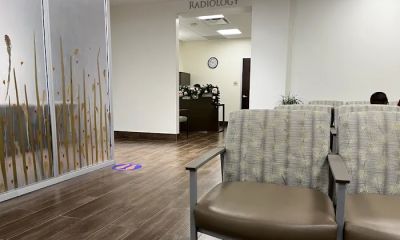Why Seeing a Cardiologist for Preventative Care Is Crucial for Your Heart Health
- 1. Understanding Preventative Care for Your Heart
- 2. Why Choose a Cardiologist for Heart Disease Prevention
- 3. Real-Life Examples: How Preventative Care Saves Lives
- 4. What Steps to Take When Visiting a Cardiologist
- 5. Taking Action: How to Start Your Preventative Care Journey
1. Understanding Preventative Care for Your Heart
Heart disease remains one of the leading causes of death globally, but the good news is that many heart-related issues are preventable. Preventative care is all about taking action before any symptoms appear, allowing you to avoid serious conditions down the line. It involves maintaining a healthy lifestyle, monitoring your heart's health, and making proactive decisions that reduce risk factors such as high blood pressure, cholesterol, and diabetes.
Seeing a cardiologist for preventative care means you're investing in your future. Cardiologists have the expertise and tools to assess your heart health and provide recommendations tailored to your unique risk factors. This isn't just about waiting until something goes wrong—it’s about being proactive to ensure a healthy heart for years to come.

2. Why Choose a Cardiologist for Heart Disease Prevention
Cardiologists are medical professionals specifically trained to diagnose and treat heart conditions. When it comes to heart disease prevention, their expertise goes far beyond general health advice. While a general doctor can help with basic health management, a cardiologist specializes in identifying subtle signs and risks for heart disease that might otherwise go unnoticed.
For instance, a cardiologist can help you understand complex factors like cholesterol levels, blood pressure, and even genetic predisposition to cardiovascular issues. Regular visits to a cardiologist ensure that these factors are monitored regularly and managed before they lead to major health complications. They can help you with lifestyle modifications and medications that reduce your risk of heart disease.
MemorialCare Cardiothoracic Surgery - Orange Coast Medical Center (Health and Wellness Pavilion)
memorialcare orange coast medical center
18035 Brookhurst St Ste. 1300, Fountain Valley, CA 92708, USA

2.1 Early Detection Saves Lives
One of the most important reasons to see a cardiologist is the ability to detect heart disease at its earliest stages. Conditions like high blood pressure and high cholesterol often don’t present obvious symptoms. A cardiologist is trained to spot these silent risk factors during routine exams, enabling early intervention that can prevent heart attacks, strokes, and other serious complications.
2.2 Customized Preventative Plans
Another significant benefit of seeing a cardiologist for preventative care is the customized treatment plans they can provide. Every individual’s heart health is different. Factors such as age, family history, diet, and lifestyle choices play a huge role in shaping your risk of developing heart disease. A cardiologist will assess your unique situation and provide a detailed plan that might include dietary changes, exercise recommendations, and sometimes even medications to reduce risk factors.
3. Real-Life Examples: How Preventative Care Saves Lives
To better understand the importance of preventative care, let's take a look at a real-life example. Sarah, a 45-year-old woman with no major symptoms, decided to visit a cardiologist for a routine heart check-up. During her examination, her cardiologist discovered elevated cholesterol levels and early signs of arterial plaque buildup.
Thanks to this early detection, Sarah was able to take action by altering her diet, increasing her physical activity, and starting a cholesterol-lowering medication. Several years later, Sarah is leading a healthier lifestyle with no signs of heart disease. Without the proactive care of her cardiologist, Sarah could have developed serious heart conditions down the road, possibly resulting in a heart attack or stroke.
Sarah’s story is not unique. Many people have benefited from seeing a cardiologist for preventative care, discovering early warning signs and making simple lifestyle changes to drastically improve their heart health. The earlier you catch potential issues, the easier it is to prevent them from becoming life-threatening problems.
4. What Steps to Take When Visiting a Cardiologist
When you decide to visit a cardiologist for preventative care, it’s important to be prepared. Here are some steps you can take to ensure your appointment is as beneficial as possible:
4.1 Gather Your Medical History
Your cardiologist will need to understand your personal and family medical history to assess your risk. Be prepared to discuss any relevant information, including past health conditions, family history of heart disease, and lifestyle habits such as smoking or alcohol consumption.
4.2 Be Ready for Screening Tests
Your cardiologist may perform several tests, such as blood pressure measurements, cholesterol screenings, or even an electrocardiogram (EKG) to check for signs of heart disease. These tests provide valuable data that will guide your heart health strategy.
4.3 Discuss Lifestyle Changes
Cardiologists often provide advice on improving your lifestyle, including dietary recommendations, exercise routines, and stress management strategies. Take note of these suggestions and commit to making long-term changes that can have a significant impact on your heart health.
5. Taking Action: How to Start Your Preventative Care Journey
If you haven’t already made the decision to see a cardiologist, now is the time to take action. Whether you’re in your 30s, 40s, or beyond, preventative care is essential for maintaining optimal heart health.
Start by scheduling a check-up with a qualified cardiologist who specializes in preventative care. They will help you assess your risk and put together a plan tailored to your needs. It’s never too early to take control of your heart health, and the benefits of early intervention cannot be overstated.
In conclusion, seeing a cardiologist for preventative care is one of the most effective ways to ensure a long and healthy life. With their expertise and guidance, you can reduce your risk of heart disease, detect problems early, and live with peace of mind knowing that you are taking the necessary steps to protect your heart.





















Hoag Urgent Care Irvine - Sand Canyon
hoag urgent care
16205 Sand Canyon Ave Suite 100, Irvine, CA 92618, USA